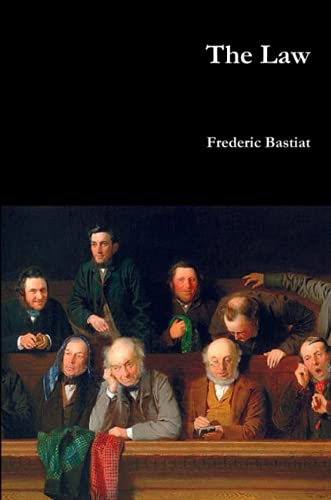Deliver to Kenya
IFor best experience Get the App



The Law
J**N
Excellent book
An excellent book helps you understand your right to defend your liberty, property and wealth.
F**K
Arguing about Frédéric Bastiat's 'The Law' is synonymous with arguing about Classical Liberalism itself.
In 1850, when 'The Law' was written, Bastiat already was gravely ill. For those who know of his writings and of the revolutionary era he lived in, it can thus be seen as a culmination of a life dedicated to liberty. Some might even know him from the so-called "Parable of the broken window", in which he argued that destruction, and money spent to recover from destruction, are not beneficial to society. 'The Law', as the title suggests, is his manifesto on the nature of law, what it ought and ought not to be, and stands as a bold defence against the ascending Socialist movement of his time. It really is a pamphlet more than a book and it is written as such with grand vigour.According to Bastiat, man is Personality, Liberty, and Property. He argues these properties to be god-given. Infringe upon them and man ceases to be. So far so good, forgoing the double fallacy he commits at this point, in light of how this idea is laid out with reason further in the text.It is in his definition of law, where we get to the meat of matter: "Law is the collective organisation of the individual right to lawful defence." Bingo! Contrary to the Socialist argument that law makes man, Bastiat argues, that in defence of Personhood, Liberty, and Property, man makes the law. And if every individual has the right to defend these properties, they also have a right to band together to provide for defence regularly (i.e. government). The elegant simplicity of his argument comes full circle, when you consider that this collective right, by its nature, cannot have any other end, than the defence of the individual. Its sole reason for existence lies within the individual right for defence. It may never 'destroy the person', as Bastiat puts it, just like the individual force may not."Within justice, law and force impose upon a man nothing more than a negation. Keeping him from harming others."There are people who then argue, that nobody has a 'right' to anything. That rights are a man-made construct. These people are enemies of civilisation. I am a Darwinist through and through, but I don't want society to be darwinistic. Humans have a potential to go beyond their primal urges, and if we are to advance the human condition peacefully, everyone has to have the right to pursue in their own enterprise. And but how are we to do so, if government wills over us by means of coercion? Application of force can by definition never peaceful. Liberty therefore is not a question of entitlement, it is the basis for human prosperity and aspiration. People have to be on their own agenda. And Bastiat saw the people of France giving away these inherent liberties willingly. Socialism ultimately became the law. And with it being the law, it was nigh impossible to combat it.According to him, Socialism really divides mankind into two categories: people and politicians. The all-knowing legislator stands above the plebs, whom he forms and moulds for a perceived greater good. But if people are so bad--Bastiat asks--that they need to be reigned-in by the power of the legislator, how can it be that his intentions are always good? Is he not himself just a man?The last part of the book is filled with quotes from the 'classics' of his age. Quotes about Ancient Societies and how their prime movers saw their citizens as nothing more than kettle, who tend towards degradation and can only be saved by the hidden power of the legislator. I found these last pages, as he goes on and on quoting from older sources, to be rather dull.I consider myself a Classical Liberal, so I am predisposed to liking this seminal piece of writing. However, I wasn't always and my Progressive younger self would probably be at awe with which reverence I speak of Bastiat's pamphlet. Now that I am older, I can see through the inherent pessimism in Socialist dogma, that people are not to be trusted and that they have to be engineered into conformity. In learning of the Enlightenment and its proponents, the marketplace of ideas, and the opposition to tyranny in its many forms, I came to reject this pessimistic world-view. And when I have the chance, I always choose peace through individual liberty, as far as I am still free to do so.I highly recommend this book not only to Classical Liberals or Libertarians, but to all those who purport to live according to enlightenment era principles. It is a rough ride and not always logically consistent, but the core of the argument is powerful and Frédéric Bastiat communicates it with contagious passion.
D**R
Urgent read for every politician and voter!
The Law is a refutation of the systems of socialism, communism and government interventionism written prior to it's publication or since. It is a logical, well-reasoned, effectively argued refutation which, in the opinion of this reader, truly does expose the unjust foundations of these economic systems and show them for the unworkable, freedom-crushing and ultimately counter-productive models that they are. All forms of statist government are based on a naïve understanding of human nature, thinking only (some) individuals are subject to corruption and not understanding that the inherent corruption of human nature only deepens with the power granted at the organized state level. This is a true classic of economics and politics and deserves to be universally read not only by all those in government but by every voter as well.But more than just a negative refutation, Bastiat makes the positive case that the law has only one purpose: to preserve justice. Bastiat convincingly bases this assertion on self evident natural law. In order to preserve and ensure justice, the law must protect the safety of persons, their property, and their freedom to make choices as they see fit. Therefore the law's purpose is negative, serving as a protection against violence, coercion and theft. The law is not to be a positive force which prescribes behaviors, even if those behaviors are generally agreed to be good things.In opposition to this limited role of the law, Bastiat shows that in socialist/communist states, the government has expanded the purpose and role of the law to include things it was never intended to. In order to do this, the government passes laws that extend far beyond the goal of justice and the law becomes grossly prescriptive rather than penal; the law legalizes behaviours for the state that, if they were perpetrated by individuals, would be considered theft and coercion. Some examples are things like social healthcare, (for example, health-conscious citizens paying for the medical bills of drug users, smokers, alcoholics and those who drive recklessly and don't wear their seatbelts), social welfare (those gainfully employed, paying with their taxes the living expenses of those who perennially refuse to work), forbidding certain behaviours because those who happen to be in power don't approve of them (certain religious practices, certain businesses because they would put a state sanctioned/owned company out of business, etc.). Basiat calls this legalized plunder. He shows convincingly that socialist and communist nations simply pass laws that make it acceptable to do at the state level what would be clearly seen as an injustice at the individual level. Legalized plunder is the correct term for the practices of wealth transfer payments and redistribution programs. Such policies make the law and the state that enforces it the worst enemy of the individuals who make up a nation. Contra this, Bastiat argues the true purpose of the law is not to enforce charity but simply to protect citizens and to ensure justice. As an aside, Bastiat is not saying there is no place for charity. He is simply saying that for charity to be charity, it must come of the free choice of individuals and not from a state-enforced policy. In the latter case, charity is no longer charity but enforced robbery (what if my state-enforced "charity" is going toward a cause that is diametrically opposed to my religious convictions or personal principles?).Basiat's thinking penetrates through the jargon used by socialists and interventionists to show that, at its heart, such systems are based on an untenable and irrational belief in human nature. Basiat observes that politicians and policy makers place blind trust in the masses to make a wise choice of who to elect, and then once those politicians are elected, they take the reigns and make decisions on behalf of the people because the people cannot be trusted to know what is best for them. You can't have it both ways...wise enough to elect the right people but too dumb to understand what would make for the best economic and punitive policies. Thus, socialist/communist tendencies are alive and well within all of the world's democracies and so-called republics, where the social elites think they are ordained to be the saviours of the common masses.Bastiat's book is a clear, concise and effective refutation of the form of government that all western democracies have become and a call to return to an era of small, limited government whose job it is to simply ensure people's physical safety from violence and people's free use of their resources as they see fit, punishing the robber and the thug. Though it was written in the mid-1800s, it is even more crucial today, in our era of huge government debt and deficits, massive bureaucracies, stifling taxation, and greedy and power-hungry politicians who bill themselves as the saviours of society. Sadly the state has become the robbers and thugs, succeeding beyond the wildest imaginations of the most successful criminals because the state can write laws which sanction their evil and greedy behaviours.The Law can be read in one sitting but really should be pondered for some time afterward with one eye on the media, listening carefully to the news about the latest proposed government program or the cries of the manifold special interest lobby groups, both of whom see it as their purpose to take the hard earned money of and privately held resources of individuals and use it for their own pet projects and to further their own ideologies.
D**O
Excellent description of what the law and its limits ought to be
If you are a person who expects and demands the government to solve all your problems, then this book gives you an excellent perspective about why that is not a good idea at all, regardless of your intentions.
A**R
Great book, horrible product
Great book, horrible product.I avoid anything by Lightning source since ordering this book. It looks like it was made in a basement. Typos, grammatical errors throughout etc...You get what you pay for, usually.However, some books are cheap and are good quality.There should be a disclaimer... this book is cheap and it is poor quality.
Trustpilot
2 days ago
2 weeks ago